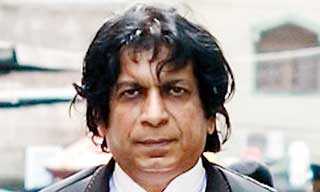Monday Feb 23, 2026
Monday Feb 23, 2026
Thursday, 13 February 2020 02:06 - - {{hitsCtrl.values.hits}}
By Chandani Kirinde
Attorney General Dappula De Livera yesterday said he had neither the power nor the authority to stop cases that were pending within any court even though some cases may be under investigation by the Commission of Inquiry (CoI) probing political victimisation.
The AG was responding to a letter from Acting IGP Chandana Wickremaratne seeking advice from the AG on the “procedure for investigations conducted and being conducted by the Criminal Investigation Department (CID), the Financial Crimes Investigation Division (FCID) and the Special Investigation Unit (SIU).
In his response De Livera noted that the staying of proceedings pending before a judicial body were matters to be decided upon by that body and “any decision to stay such proceedings are outside the scope of Executive authority”.
 |
|
Attorney General Dappula De Livera
|
While the copy of the letter sent by the Acting IGP was not made available to the media, members of the Commission of Inquiry (CoI), appointed by President Gotabaya Rajapaksa to probe alleged political victimisation of public officials and tri-forces personnel under the previous administration, had written to the AG last month directing him not to proceed with the case against former Navy Commander Admiral Wasantha Karannagoda and former Navy Spokesman Commodore D.K.P. Dassanayake, who were charged in connection with the abduction of 11 youths between 2008 and 2009.
The AG rebuffed the CoI directive, saying that the commission had no statutory or legal authority to order the AG to refrain from performing his statutory functions in the case.
In his letter to the Acting IGP, the AG said that matters elicited at any inquiry or investigation conducted under the Commission of Inquiry Act (Chapter 393) and any recommendations made thereon were matters to be considered by a judicial body before which such a matter or proceeding is pending including any prejudicial impact on such a matter or proceeding and to make such appropriate order it may deem fit, having regard to the facts and circumstances of a case.
“In the circumstances, in the absence of an order from such a judicial forum contemplated under Article 4(c) read with Article 105 of the Constitution in terms of the procedure established by the law, it would be outside the scope of my powers or authority or of any of my officers acting under my authority to refrain from diligently prosecuting and taking all steps in that regard before such a judicial fora,” the AG explained.
He noted that the CoI Act (Chapter 393), amended by Act No 16 of 2008, conferred no powers on the commission to make an order to stay the proceedings before a court of law or to issue such directions to the AG to refrain from prosecuting, appearing or assisting in matters before any court or tribunal as the case may be established in terms of the law.
In an earlier communication, the CoI had directed the AG to delay the case against Karannagoda and Dassanayake, who had lodged a complaint with the CoI on 22 January, until it handed over its recommendations to President Gotabaya Rajapaksa. The CoI had been given six months to furnish an interim report.
The President appointed the commission on 9 January and initially included the inquiry to centre on any malpractice, irregularity or non-compliance with or disregard of the proper prudence, norms, guidelines, procedures and best practices applicable in relation to the administration of the Commission to Investigate Allegations of Bribery or Corruption (CIABOC), Financial Crimes Investigation Divisions (FCID) or the Special Investigations Unit (SIU) of the Police. He issued a second Gazette on 22 January to expand its scope to include the Criminal Investigation Department (CID) and ascertain if inquiries, investigations and legal proceedings against officers of the tri-forces and Police under the last Government affected national security.
The second Gazette notification said the President’s decision to expand the scope of the CoI was taken after it was brought to light that due to the intervention of a politically influential third party there was the likelihood of prejudice being caused to some party or persons in the administration of the law or administration of justice and action being instituted by the said agencies with regard to the complaints made in relation to officers of the tri-forces and Police and had an adverse impact on national security.
The CoI is headed by retired Supreme Court judge Upaly Abeyrathne while its other members are retired Court of Appeal judge Daya Chandrasiri Jayathilaka and retired Inspector General of Police Chandra Fernando.